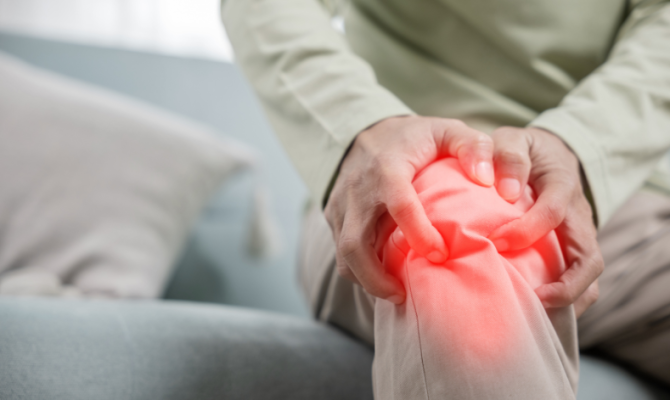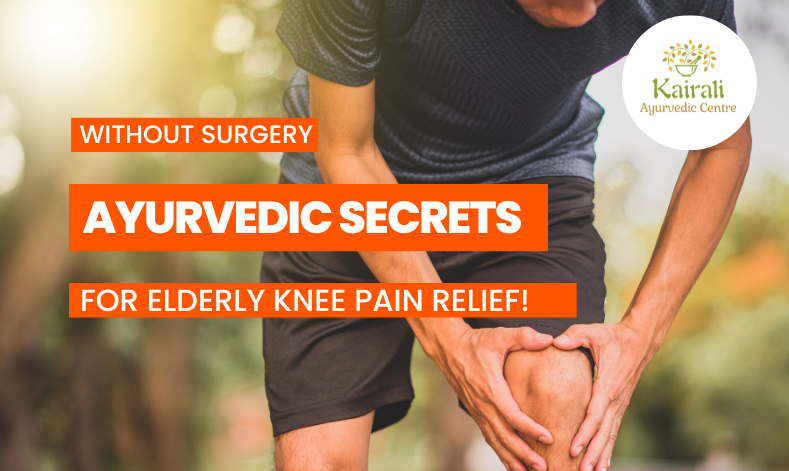Blogs
Ayurvedic Secrets for Elderly Knee Pain Relief!
Joint discomfort, particularly knee joint pain, presents considerable issues, especially in the senior population (those aged 65 and above). As people age, they frequently experience degeneration, also known as wear and tear.
Ayurvedic Treatment offers a systematic therapeutic approach to knee pain that takes into account each individual’s constitution and pathology. According to Ayurveda, knee discomfort happens because of an imbalance of Vata dosha. This imbalance leads to degeneration, inflammation, and less lubrication in the knee joints. To build a customised treatment plan, the clinical approach includes a thorough evaluation of the patient’s constitution, a physical examination of the afflicted joint, and an assessment of the underlying pathology.

Causes of Knee Joint Pain in Ayurveda
Knee joint pain can stem from various causes, but for elderly people, the most common culprit is osteoarthritis (OA). This condition occurs due to degenerative changes, where the cartilage and joint structures wear down over time, leading to the natural breakdown of joint components. Past joint injuries, excessive strain, and incorrect usage all contribute to the progression of OA. Other factors are:
- Inflammatory Arthritis (RA): Autoimmune inflammation.
- Post-Traumatic Arthritis: A condition caused by previous injuries or trauma.
- Gout is the inflammation caused by uric acid crystals.
- Infection: A bacterial, viral, or fungal joint infection.
- Bursitis is inflammation of fluid-filled sacs surrounding the knee.
- Tendonitis: Inflammation of the knee tendons.
- Ligament Injuries: Tears cause instability.
- Meniscus tears result from twisting or abrupt motions.
- Bone Tumours or Lesions: Abnormal growths on the kneecap.
External factors:
- overexertion and repetitive strain from high-stress occupations.
- Improper footwear: A lack of sufficient support.
- Obesity: Excess weight strains the knee joints.
- Poor posture or mechanics refers to incorrect bodily alignment.
- Metabolic Disorders and Their Impact on Joint Health.
- Neurological conditions that affect pain perception.
- Vascular Issues: Circulation affects joint health.
Clinical interventions for knee pain in the elderly.
Total Knee Replacement (TKR) is a surgery for severe osteoarthritis (OA) in the elderly. It’s usually considered when the knee joint is extensively damaged and needs to be replaced with an artificial one. Arthroscopy, which involves inserting a small camera and instruments into the joint, can be used for diagnosis and sometimes treatment. However, some factors can make these surgeries unsuitable, like poor overall health, high surgery risks, and situations where OA symptoms continue despite conservative treatments and don’t justify surgery. While old age does not always rule out surgery, general health and life expectancy are important considerations.
Ayurvedic Clinical Intervnetions
Ayurveda’s approach to avoiding Total Knee Replacement (TKR) is complex. Following a thorough examination of the patient’s constitution and presenting problems, Ayurvedic practitioners devise a treatment strategy that includes pacifying Vata dosha or treating related issues. Ayurvedic treatments aimed at preventing the need for TKR surgery include integrative rehabilitation, which combines physical therapy with exercises, manual techniques, and educational components to improve joint functionality and reduce pain, as well as medical management, Panchakarma, diet, and lifestyle changes based on individual constitutions.
Personalized Treatment for Elderly Patients at Kairali Ayurvedic Centre:
In older individuals, variables such as reduced musculoskeletal strength and age-related degenerative changes must be carefully assessed. These factors are taken into account when developing the treatment strategy. Medication dose, delivery techniques, and therapy procedures are adjusted to guarantee safety and efficacy in older people.
Aside from directly treating knee discomfort, focus is placed on dietary changes, lifestyle changes, and mild workouts tailored to the individual’s ability to preserve joint health and mobility. Ayurveda’s therapeutic approach to knee pain care in the elderly is based on a personalised therapy paradigm that tackles the underlying cause by harmonising exacerbated doshas and correcting joint pathology. Ayurveda provides a complete strategy for relieving knee pain and improving quality of life in the elderly by combining herbal formulations, external treatments, internal drugs, and, if necessary, Panchakarma procedures.
Kairali Ayurveda’s whole-person approach is a viable avenue for controlling knee pain and improving general well-being in the ageing population. For the best results, contact with a trained Ayurvedic practitioner. This provides an accurate diagnosis, a personalised treatment plan, and the safe execution of Ayurvedic therapies, particularly for severe knee pain among the elderly.
OUR SUCCESS CASES
Follow us on: YouTube | Instagram | Facebook

